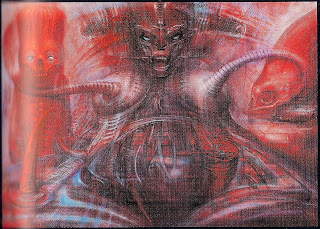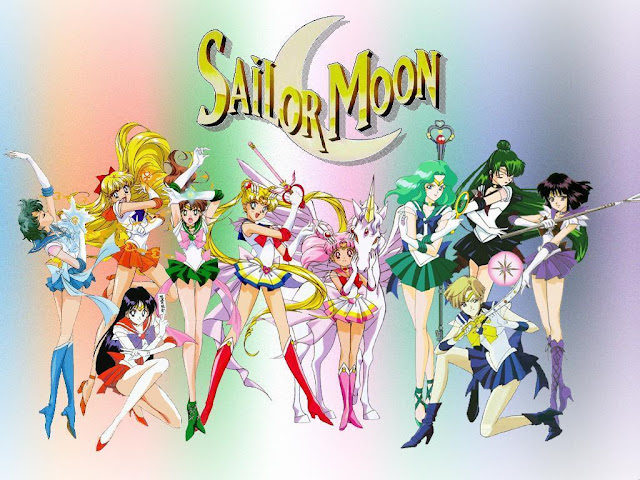 |
| Sailor Moon characters |
Guest post written by Myrna Waldron. Cross-posted from Soapboxing Geek with permission.
This has been a post I’ve been meaning to write for a long time. I’m an absolutely die-hard fan of Sailor Moon, and part of that is because it served as my childhood introduction to feminism. That might be a little bit hard to believe, considering the superheroines of the show are known for outfits not much more revealing than Wonder Woman’s. Silly outfits aside (you get used to them), this show was absolutely groundbreaking. Its protagonists are 10 realistically flawed, individual and talented teenage girls (and women) who, oh, you know. Save the world.
First, let me take you back in time to the summer of 1995. I’m a 9-year-old Canadian girl with a lot of time on her hands. I’m bored out of my mind, because there’s very little on television that appeals to me. Sure, there were shows made for girls back then. But they were Care Bears and My Little Pony (and I sure as heck don’t mean the Lauren Faust version) and obviously meant for very young girls. Jem and She-Ra are long since off the air, and the Powerpuff Girls won’t premiere for another 3 years. Generally, my choices were gender-neutral shows like Alvin & The Chipmunks, or male-audience shows like the 90s revival of Spider-Man. I wanted a little action. And, bless the alignment of the stars, I see this commercial for this new show called Sailor Moon. The stars aligned so perfectly that I happened to tune in on August 28th, 1995, the day that Sailor Moon premiered on YTV. I was hooked after one episode, and I can honestly say that this show changed my life.
So why is Sailor Moon feminist, besides having a mostly female cast? I have decided to take a page from my previous
feminist Disney Princess essay and go through the characters individually, and explain why I, as a feminist, value them. Although I initially got into Sailor Moon via the English version, I will be basing my analysis off of the Japanese version of the series. I have long since felt that the English version does a disservice to its fans by making the characters immature, censoring homosexuality, and stereotyping what it is to be a teenager. I will also plead artistic license on the spelling and order of the names. So, without further adieu, the Sailor Soldiers.
 Sailor Moon/Usagi Tsukino
Sailor Moon/Usagi Tsukino:
Our heroine. Our very flawed heroine. And how refreshing that is! Instead of a very boring Superman who could do no wrong, here was a fairly young teenager thrown into an overwhelming situation, and reacting negatively to it. She’s clumsy, she’s a glutton, she’s a crybaby. And that’s okay! Teenagers are allowed to have flaws, and superheroes should too. Usagi has demonstrated time and time again that her love for her friends and family is more important to her than anything else in the world. She will give anything, including her life, to make sure that they live on in peace and happiness. As we see in flashbacks during the R movie, she’s the type of person who is willing to be friends with everyone, including the loners and the outcasts. She’s got a tremendously strong moral compass, and is a consummate optimist. Her relationship with Mamoru is firmly established as one of unconditional trust, support, and equality. Overall, Usagi’s character establishes that a good leader does not have to be someone unrealistically perfect. A good leader just needs to care for everyone equally.

Sailor Mercury/Ami Mizuno:
Ami is by far the most popular character in the show (on both sides of the Pacific). It has been theorized that this is because she exhibits the character traits most valued in Japanese society. She’s incredibly studious, brilliant, analytical, and humble (some might even say submissive). What I appreciated most about Ami is how she approaches situations with logic rather than with emotion. Her style of fighting is mostly defensive, so she acts in a support role on the team. She is by no means not valued by the others, as they often turn to her to give the answers that intuition alone cannot determine. In her civilian life, we see that she is very shy, and is sometimes uptight. She also exhibits a tendency to be insecure, and has taken it very hard that her devotion to her studies has ostracized her from her peers. Ami’s character establishes that even the most mature teenager doubts themselves sometimes, and that it’s okay to do so. It’s very feminist to say that we’re allowed to see doubts in ourselves, and that it’s okay to play a supporting role rather than to be a leader.
 Sailor Mars/Rei Hino
Sailor Mars/Rei Hino:
Rei’s character is probably the most unfairly treated by the fans, and especially by the dub. Yes, she and Usagi argue all the time. Friends sometimes do that. One aspect of Rei’s character that gets lost in translation is just how close she is to Usagi. The inners usually refer to each other with the “-chan” suffix, which usually denotes a female friend. Rei, however, just calls Usagi “Usagi.” To leave off a suffix indicates incredible closeness, like the relationship between best friends. Now, as for Rei herself, she has some traits that feminists definitely value. She’s very ambitious – she has some interest in men, but would rather focus on achieving her career dreams first. She’s also quite generous – she offers up space in Hikawa Shrine for her friends to study in, and joins them, even though she doesn’t need to take a high school entrance exam. She does this entirely out of solidarity. She also regularly uses her gift of premonition to help her friends, not herself. Rei is someone who knows exactly what she wants out of life – her confidence contrasts nicely with Ami’s character. Here is a character who encourages women to dream, and dream big.
 Sailor Jupiter/Makoto Kino:
Sailor Jupiter/Makoto Kino:Makoto is one of the more interesting characters when cast into a feminist light. What Makoto is good at, and the things she loves doing most, are traditionally domestic hobbies like cooking, baking, and cleaning. Being domestic is not the least bit anti-feminist, as women should be able to be whatever makes them happiest. One subtle aspect of her character is her body insecurity, which is a common issue for women that gets comparatively little media attention. As a very tall, athletic and curvy girl, Makoto often feels self-conscious about her body – especially since she is stereotyped by others as a tomboy. She breaks the stereotype of what certain “types” of women are “supposed” to be interested in. She is much more boy-crazy than the others, but I see this more as a manifestation of loneliness. She is an orphan, and while incredibly independent, she has no one besides her friends to confide in. Makoto is one of my favourite characters because she does not allow herself to be confined to anyone’s idea of what a young woman should be. Her protective instincts and fierce independence are incredibly admirable.
 Sailor Venus/Minako Aino
Sailor Venus/Minako Aino:
Minako combines a few of the traits of the others (leadership and bad habits from Usagi, ambition from Rei, athleticism from Makoto) but still manages to stand completely on her own. As the personification of the Goddess of Love, Minako’s made it her life’s mission to bring love and joy to others. Her career ambitions are even more defined than Rei’s, as she is shown actively pursuing becoming an idol singer. She was also chronologically the first Soldier to awaken, and this was an inspiration of strength, independence and courage for Usagi. Her backstory, which revealed that she chose to fake her own death rather than come between her two best friends’ romance, despite being in love with one of them, shows tremendous self-sacrifice. Although I would hope no one would have to make the choice Minako did, it’s an important message that sometimes our dreams don’t work out, but that people go through tremendous maturity and growth when they learn to let them go and seek out new dreams. Venus’s self-confidence and determination towards her dream career is another good message – learn what you’re good at, love what you’re good at, and don’t let anyone try to bring you down.
 Sailor Chibi-Moon/Chibiusa Tsukino
Sailor Chibi-Moon/Chibiusa Tsukino:
Long story short, she’s Usagi’s future daughter, and she’s like her in every way. Starting with the S season onwards though, she starts to come into her own as a distinct character. Usagi has a natural ability to befriend people, but Chibiusa is lonely and, having grown up in isolation as the crown princess, doesn’t really know how to approach people. She also starts out spoiled, but it is excused in that she is physically about 5 years old at her introduction. Where Usagi is ditzy and flighty, Chibiusa is often surprisingly wise beyond her years and is an excellent student – traits, I believe, she inherited from her father. One feminist aspect of her character is her devotion and admiration for her mother. By this, I mean Neo Queen Serenity, not Usagi. Chibiusa values NQS’s grace, maturity and strength. Her greatest dream is to become a mature young woman like her mother eventually became. Chibiusa herself eventually ages to about preteen/early teen age and is much more emotionally mature than how she was at the beginning of the series. This shows the series’ willingness to allow its characters to grow and change, like a real woman would.
 Sailor Pluto/Setsuna Meioh
Sailor Pluto/Setsuna Meioh:
The Outer Senshi as a whole are noted for being a little bit older (with one…interesting exception) and a little bit wiser than the Inner Senshi. No one personifies the gifts of age and wisdom better than Setsuna. She is the Guardian of Time, and is thus more-or-less immortal because of her duties. However, her duties, as important as they are, are also a curse. She must remain aloof and separate from the others, except in times of crisis. We see glimpses of the loneliness (loneliness is kind of a theme in this series) this causes, but she is incredibly stoic and refuses to let this on to others. She is not truly aloof, as we see in her relationship with Chibiusa. She is incredibly kind and supportive to her, and many have recognized this as a kind of bittersweet maternal instinct. When she adopts a civilian life, she is established as a brilliant scientist, with skills in both biology and physics. This is an important feminist message, as it reaffirms that women have equally valuable skills to offer in the maths & sciences.

Sailor Uranus/Haruka Tenoh:
I’m going to digress a little before I get into analyzing Haruka’s character. Uranus and Neptune were my first introduction to homosexual relationships. Although they were never shown kissing, it was obvious to me that they were in a romantic relationship. And, because I benefited from a largely agnostic upbringing, my only thought as a kid was, “Well, that’s unusual, but so what?” I credit these two characters for showing me that a lesbian relationship is just as loving and just as valid as any other one. It is a feminist belief that people should be allowed to embrace and affirm their sexual identities. Now, as for Haruka herself, she’s one of my absolute favourite fictional characters. She’s even more tomboyish than Makoto (she often physically presents herself as male, though since she identifies as female she is not transgendered) and is an incredibly talented athlete and race car driver. She also possesses a genius intellect. Despite her tough exterior, she shows a “softness” streak in her personality. In the S season, she is much more uncomfortable with the harsh choices she and Neptune must make in order to prevent the world’s destruction. In the episode when Usagi’s heart crystal is stolen, Haruka is shown slamming down in frustration and grief at the thought of having to sacrifice Usagi’s life should her heart crystal be one that forms a world-saving talisman. Haruka is wracked with guilt and sees her hands as being dirty, and must be reminded by Michiru that although the sacrifice of three innocent people is horrible, the destruction of the world is much worse. She is thus an example of someone who defies the stereotype of the tough, masculine woman by demonstrating empathy and vulnerability. In addition to this, many of the younger fans have had difficulty understanding Haruka’s appearance and sexuality (such as thinking that she’s a hermaphrodite or carries the soul of her nonexistent twin brother or something), so she’s an important example of how gender expression and sexuality can and will differ from the “norm.”
 Sailor Neptune/Michiru Kaioh
Sailor Neptune/Michiru Kaioh:
The polar opposite of Usagi. And that’s great, because one of this show’s greatest strengths is to show how diverse young women can be. Michiru is a gifted artist, both as a violinist and as a painter. She is about 15-16 when she is introduced, but has already made a career as a world-class performer and artist. Haruka often plays piano as her duet partner. She is also quite athletic, but prefers swimming (since it is her element) to running. She complements Haruka’s outward masculinity by presenting herself with a traditionally feminine appearance. Similarly, while Haruka is the “softer” of the two when it comes to performing their duties, Michiru defies the ultra-feminine stereotype by having a much colder and more determined outlook. She and Haruka are absolutely inseparable; two sides of the same coin. She serves as another important feminist example that “traditional” gender performance and sexuality have nothing to do with each other. She defies yet another stereotype of women, especially lesbian women.
 Sailor Saturn/Hotaru Tomoe
Sailor Saturn/Hotaru Tomoe:
My personal favourite. Another character who experiences incredible loneliness, her character arc explores her new friendship with the equally lonely Chibiusa while she struggles with poor health and a mostly absent (and as we learn later, possessed) father. Her friendship with Chibiusa is absolutely adorable. It is an almost ideal best friend situation – no rivalry, no clashing of personalities. They just genuinely enjoy spending time with each other. Chibiusa, now having learned how to be a good friend, worries about Hotaru and does everything in her power to help her. In the S season, Hotaru has the incredible burden of carrying three separate identities – the good (herself), the evil (Mistress 9) and the neutral (Sailor Saturn). Uranus, Neptune and Pluto’s mission is to prevent the awakening of Sailor Saturn, who has the power of life and death and is prophesied to destroy the world. At the end of the season, Hotaru overcomes Mistress 9’s possession by drawing power from her love for others, namely her father and Chibiusa. This love also allows her to turn the prophecy on its head; she uses her destructive powers to destroy evil from its inside, knowing that she will not survive the effort. But, since she also has the power of life, she is instantly reincarnated as a baby, and rescued by a despondent Sailor Moon. She is similar to Usagi in this sense since she is willing to make the ultimate sacrifice for others. Her storyline is resumed two seasons later in the Stars season, and has some very interesting feminist subtexts. Sailor Pluto, recognizing that Saturn’s power will soon be needed once more, adopts Hotaru from her amnesiac father. Due to the pressing need for Saturn’s power, Hotaru grows physically and intellectually at a staggering rate. Setsuna, Michiru and Haruka raise her together, and Hotaru sees each one equally as her parent, calling them Setsuna-mama, Michiru-mama, and Haruka-papa. Similarly to how positively Haruka and Michiru’s relationship is depicted, alternative families are thus depicted positively in this series as well.
I hope you have enjoyed my feminist analysis of the main Sailor Moon cast. This will not be my only examination of the series, as there is so much more I want to say and not enough room in one Tumblr post to say it. The main point I want to get across is just how incredible and important this series is for women of any age. It depicts female characters of incredible strength, ability, kindness and diversity. It shows us just how badly we need more shows like Sailor Moon in the world, and how very little attention is given to superheroines. (Still waiting on that Wonder Woman movie, Warner Bros.) 20 years later, Sailor Moon is still groundbreaking, still influential, still feminist. And in the name of the Moon…that’s pretty awesome.
Original source for the character images borrowed from Manga Style!.
Myrna Waldron is a 25-year-old pop culture fanatic with a special passion for animation. She can be reached on Twitter at @SoapboxingGeek, where she muses openly about whatever strikes her fancy.



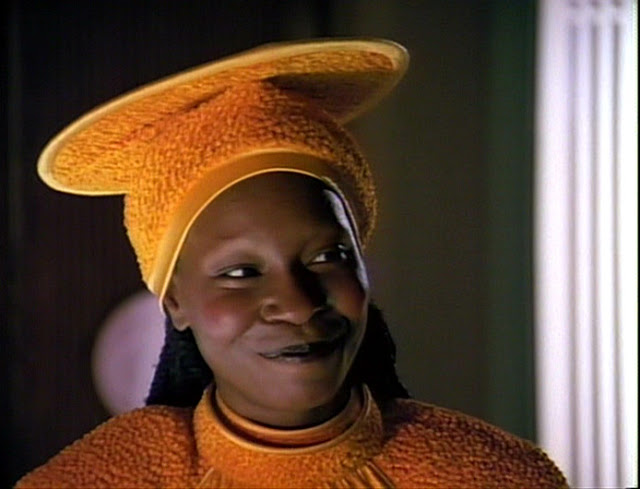


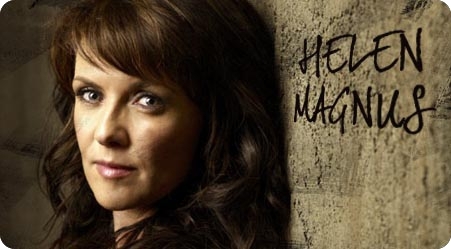

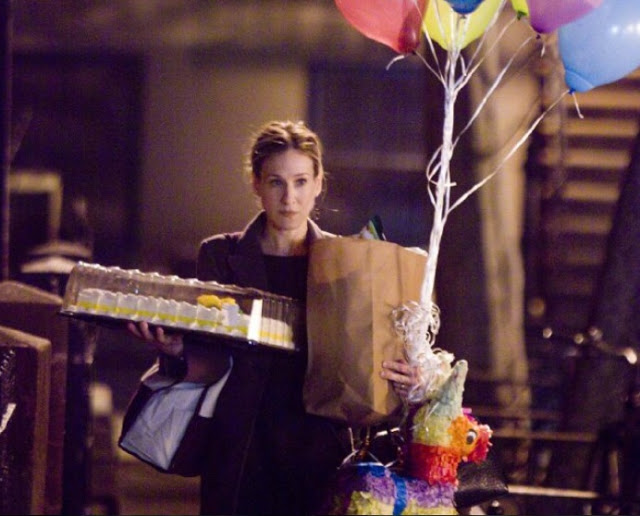


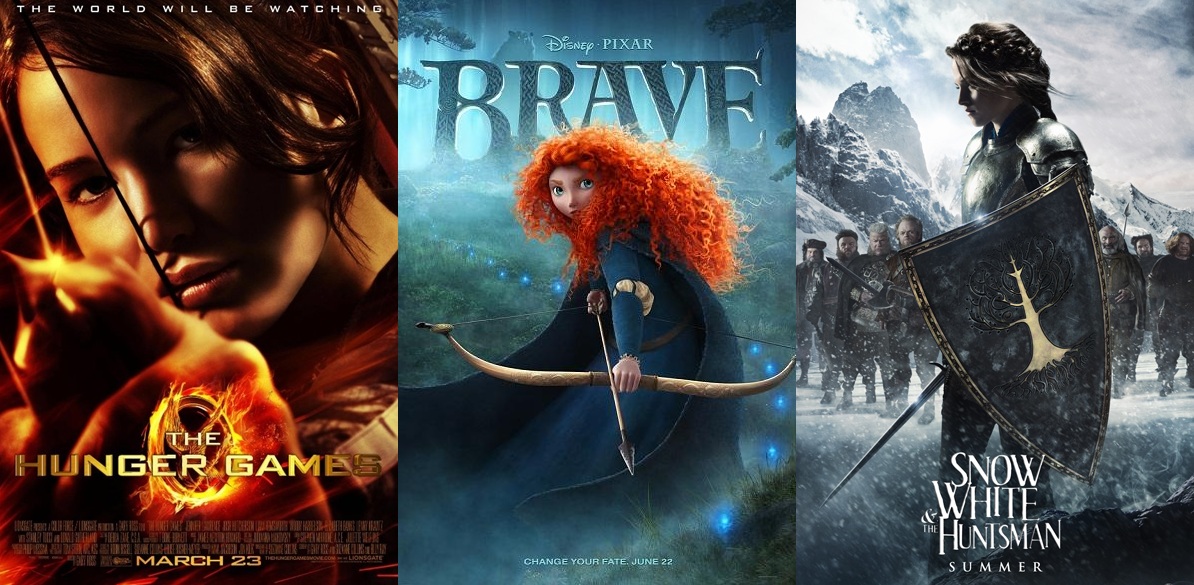

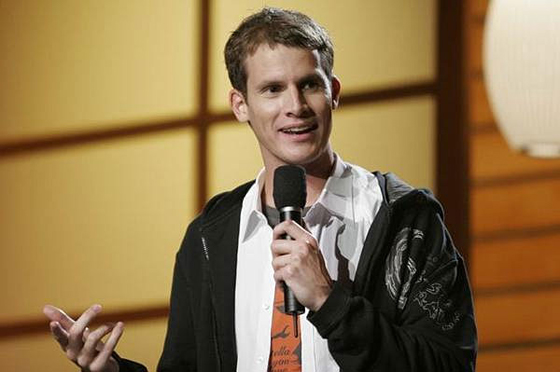



 Sailor Moon/Usagi Tsukino:
Sailor Moon/Usagi Tsukino:
 Sailor Mars/Rei Hino:
Sailor Mars/Rei Hino:
 Sailor Venus/Minako Aino:
Sailor Venus/Minako Aino: Sailor Chibi-Moon/Chibiusa Tsukino:
Sailor Chibi-Moon/Chibiusa Tsukino: Sailor Pluto/Setsuna Meioh:
Sailor Pluto/Setsuna Meioh:
 Sailor Neptune/Michiru Kaioh:
Sailor Neptune/Michiru Kaioh:
